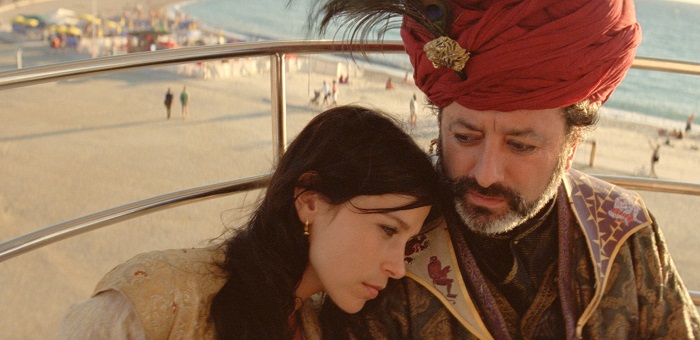Cannes 2016 Interview: MUBI curator Chiara Marañón on competing to acquire the best of the fest
Simon Kinnear | On 22, May 2016
Inside VOD: We take you behind the scenes of the video on-demand industry by interviewing key figures in the streaming world.
It was a year ago that VOD platform MUBI shocked the industry at the Cannes Film Festival by announcing its acquisition (with co-distributor New Wave Films) of Miguel Gomes’ festival hit, Arabian Nights.
With Arabian Nights now successfully released in cinemas and the three-part film set to premiere across three days from 27th May, MUBI has been back in Cannes this month with a 12-strong team. VODzilla.co pops along to the MUBI stall in the Marché Du Film to meet Chiara Marañón, MUBI’s UK curator – the woman who decides which movies you can see on the ever-popular platform.
How has Cannes 2016 been for MUBI? “It’s very exciting,” says Chiara “Since last year, our role has changed significantly. Previously, our main focus was meeting industry people, negotiating the rights to their film libraries. Now, content acquisition is key.”
After wowing the industry last year, people are now looking at MUBI to see what they pick next. The site has already taken on four films from Berlin this year, and also acquired Mathieu Amalric’s Blue Room for the UK. The latter, by the actor-turned-director, played in Cannes in 2014, but hasn’t been released in British cinemas. That’s about to change.
“Exhibitors are excited and the film will have a theatrical release later this year, before going online,” adds Chiara, “but this time we are sole distributor.”
What of Cannes 2016? Chiara cannot say while deals are still being struck, but her wishlist covers the whole range of films available at the Festival, from the Competition to Un Certain Regard – and MUBI is aiming for UK and US rights for the films it acquires.
Will films go straight to MUBI online, or will they follow the example of Arabian Nights and The Blue Room, by appearing first in cinemas? It all depends on the film.
“While we don’t want to become a theatrical distributor, it makes sense for certain films because it helps to put our brand out there,” she explains.
Certainly, Gomes’ three-part epic represents the benchmark for how MUBI can successfully co-exist with cinema exhibitors. “It’s a big statement for us, so it was critical to negotiate the window. Usually it’s months, that wouldn’t work for us because we needed to keep awareness high. In the end, New Wave released on three consecutive Fridays, followed by the films running on the Discover Tuesdays strand at Picturehouse cinemas. That stretched the life of the films, so we could maintain the message until the online launch.”
The most important thing to communicate was that it doesn’t matter in which order you watch the films. “In France, the films were released once a month. It didn’t work, because by the time the second film came out, audiences believed they couldn’t watch it because they’d missed the first.”

Miguel Gomes’ Arabian Nights
Chiara is keenly aware of the value of a cinema release in terms of hype: “It gets extra press and coverage that we can leverage to reinforce the message that MUBI makes the best films available to our subscribers.”
As the head curator for MUBI, Chiara is at the centre of fulfilling that remit. What does curating involve?
“Essentially there are two types of films. The first are library titles. We have substantial deals with many studios and distributors, with lots of big names. But it’s also about discovery, and bringing new films to the platform.”
Is there a magic formula to how these elements are combined? “I want an eclectic selection, films that wouldn’t usually be conceived together. Our message is there’s something for everyone.” As a rule of thumb, Chiara aims to have one such ‘new’ film per week, although inevitably that changes depending on circumstances – with Arabian Nights, for example, the trilogy will run on consecutive days.
While rights inevitably vary between territories, there’s an increasing move towards synchronisation. Given MUBI’s increasing focus on global exclusives, such as last year’s Junun, how much autonomy does Chiara have to select what plays in the UK? “We divide the world into three, with dedicated curators. The UK is the main focus, then there is the USA, and the rest is currently dealt with as one international territory. The three of us work closely together.”
She adds: “Our global presence is a real asset. We want more and more global events, and of course it’s easier to go global with niche content. We’re looking for festival gems, as fresh as possible to provide a special presentation.” But as the recent availability of Jacques Rivette’s 12-hour Out 1 proved, it doesn’t have to be new films. “When we join forces, it’s a powerful message that you can see these films anywhere in the world.”
Another area where Chiara can mix-and-match the familiar with the not-so-well-known is with big seasons, such as a 1980s week planned for June. But she schedules loosely, knowing there is always the potential for something topical that warrants adding an unexpected film to the slate. “The room to be flexible is always there. It makes it feel alive. Even if the schedule is locked, I reserve the right to change it at the last minute.”
Making those decisions is helped by the copious data now available to Chiara; the existing habits of MUBI subscribers can help determine the likely reception of a film. Friday and Sunday are the hottest days of the week for traffic, which is why these days tend towards bigger or more well-known films. Similarly, past performances give a reliable barometer for anticipating the likely reception to a new addition. “80 per cent of films follow a U-shaped curve, strongest at the very beginning and the very end.”
Chiara confirms, though, that she can still be surprised.
“Recognisable films like Taxi Driver do well, as you’d expect, but so did Bruno Dumont’s P’tit Quinquin,” she comments. Perhaps, though, it isn’t surprising at all. Chiara says the latter is now one of her favourite films and, with MUBI’s subscription base growing, it’s surely inevitable that regulars share her tastes?
Ultimately, it’s that passion for film that puts MUBI in a strong position to convince sellers at Cannes that it’s the best company to release their films – regardless of whether those films get shown online, in cinemas, or both.
“As an online company, we don’t feel we’re in competition with real cinemas,” she says. “After all, we’re still the biggest fans of the cinema experience.”
So, while we wait for news on exactly which films MUBI acquired at Cannes this year, one thing you can be sure of: they’ll be very good ones.
A subscription to MUBI costs £4.99 a month. For more information, head to click here.




















